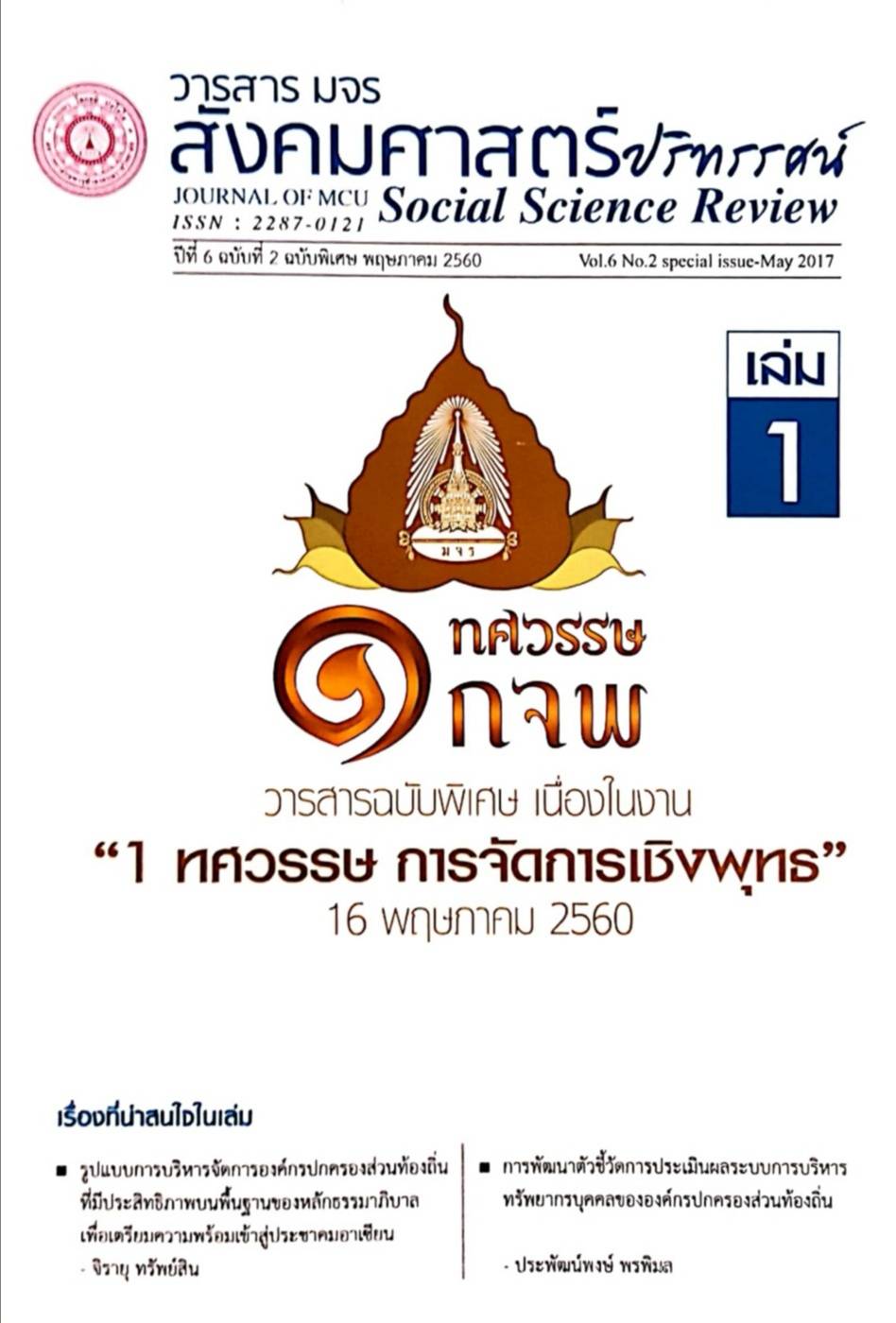รูปแบบการจัดการการเผยแผ่พระพุทธศาสนาที่ส่งเสริมการดาเนินชีวิตและธำรง เอกลักษณ์ของชาวมอญในกรุงเทพมหานครและปริมณฑล
คำสำคัญ:
การบริหารงานศาสนบุคคล การปกครองคณะสงฆ์บทคัดย่อ
การวิจัยครั้งนี้มีวัตถุประสงค์ (1) เพื่อศึกษาสภาพทั่วไป ปัญหาอุปสรรคการบริหาร
บุคลากรที่เป็นพระสังฆาธิการในการปกครองคณะสงฆ์ จังหวัดสมุทรปราการ (2) เพื่อศึกษาแนวคิด
ทฤษฎีเกี่ยวกับพัฒนาการบริหารงานบุคคลด้วยแผนการบริหารจัดการ (3) เพื่อเสนอการ
บริหารงานศาสนบุคคลในการปกครองคณะสงฆ์จังหวัดสมุทรปราการ
การวิจัยเป็นแบบผสานวิธี คือ ทั้งเชิงปริมาณและเชิงคุณภาพ เก็บรวบรวมข้อมูลเชิง
คุณภาพโดยการสัมภาษณ์เชิงลึกจากผู้ให้ข้อมูลสาคัญ โดยใช้การเลือกแบบเจาะจง จานวน 22 รูป/
คน และการสนทนากลุ่มเฉพาะกับผู้ทรงคุณวุฒิ จานวน 8 รูป/คน วิเคราะห์ข้อมูลเนื้อหา จากทั้ง
สองวิธีด้วยการพรรณนา เพื่อจัดหมวดหมู่ของเนื้อหา แล้วนามาสังเคราะห์เชิงระบบ เพื่อหา
ประเด็นร่วมหรือประเด็นหลักและอธิบายเนื้อหา เก็บข้อมูลเชิงปริมาณ กับกลุ่มตัวอย่าง คือ
พระสงฆ์ในจังหวัดสมุทรปราการ โดยวิธีการสุ่มตัวอย่างได้ขนาดของกลุ่มตัวอย่าง 351 รูป แบบใช้
แบบสอบถามซึ่งมีค่าความเชื่อมั่นทั้งฉบับเท่ากับ 0.916 วิเคราะห์ข้อมูลด้วยสถิติพรรณนาคือ
ความถี่ ค่าร้อยละ ค่าเฉลี่ย และส่วนเบี่ยงเบนมาตรฐาน
ผลการวิจัย พบว่า
1. สภาพทั่วไปของปัญหาอุปสรรคการบริหารงานบุคลากรที่เป็นพระสังฆาธิการในการ
ปกครองคณะสงฆ์ในจังหวัดสมุทรปราการ 1) ด้านการวางแผน การมอบหมายงาน การติดตาม การ
สรุปผลการดาเนินงานยังไม่มีความชัดเจน 2) ด้านการสรรหา ขาดการจัดการทรัพยากรมนุษย์ให้
ตรงกับความต้องการจากจานวน อายุ ตาแหน่ง ทักษะต่างๆ 3) ด้านการพัฒนา มีนโยบายที่จะ
ผลักดันการพัฒนาพระสังฆาธิการหลายด้านเกินไป ควรเจาะจงในแต่ละด้าน บุคลากรที่เข้ามาอยู่ใน
วัดอบรมได้ยากขึ้น เพราะเจ้าอาวาสขาดการศึกษา ความเชื่อถือชุมชน การศึกษาของคณะสงฆ์ฝุาย
นักธรรมและบาลี ไม่สนองตอบต่อเปูาหมายของพระพุทธศาสนาอย่างแท้จริงและมีการใช้เทคโนโลยี
ในการติดต่อสื่อสารกันมากเกินไปทาให้ขาดมนุษยสัมพันธ์ซึ่งกันและกัน 4) การธารงรักษา การ
ปกครองมีการสร้างกาลังใจมีแรงจูงใจในการปฏิบัติหน้า เจ้าคณะปกครองรับฟังปัญหาที่อาจเกิดขึ้น
และพร้อมที่จะให้คาแนะนาในการดาเนินงานให้บรรลุวัตถุประสงค์
2. แนวคิดเกี่ยวกับพัฒนาการบริหารงานบุคคลด้วยแผนการบริหารจัดการ ได้แก่ 1)
ด้านการวางแผน การวางแผนเพื่อประชุมปรึกษาเพื่อหาข้อยุติในการวางแผนและใช้แผนในการ
ปฏิบัติงานและให้สอดคล้องกฎมหาเถรสามาคมและหลักพระธรรมวินัยตามพระราชบัญญัติคณะ
สงฆ์เพื่อใช้ในการปฏิบัติการด้านการวางแผนให้เป็นรูปธรรมที่ชัดเจน 2) ด้านการสรรหาพระสังฆาธิ
การที่เหมาะสมเป็นที่ยอมรับของคณะสงฆ์โดยใช้ระบบอาวุโส คุณสมบัติการศึกษา เพื่อการ
ดาเนินการด้านการปกครองคณะสงฆ์มีประสิทธิภาพ 3) ด้านการพัฒนา ส่งเสริมพัฒนาศักยภาพ
ของคณะพระสังฆาธิการในการศึกษา การพัฒนาความรู้ เพื่อนามาประใช้ในการปกครองของคณะ
สงฆ์ เสริมสร้างให้ทรัพยากรมีความรู้ความสามารถ ทัศนคติ และประสบการณ์เพิ่มขึ้นจนสามารถ
ปฏิบัติงานในตาแหน่งปัจจุบันได้อย่างมีประสิทธิภาพและประสิทธิผลขณะเดียวกันพร้อมที่จะ
รับผิดชอบงานตาแหน่งสูงขึ้นเพื่อให้องค์การสัมฤทธิ์ผล 4) ด้านการธารงรักษา พิจารณาความดี
ความชอบตามความรู้ความสามารถเพื่อเลื่อนหรือเพิ่มตาแหน่ง การเลื่อนตาแหน่งตลอดจน
พิจารณาตามความรู้ความสามารถในแต่ละด้านและให้โอกาสคณะสงฆ์ผู้ที่เข้ามาใหม่ได้แสดง
ความสามารถที่ตนเองมีและต้องยึดหลักธรรมมาภิบาล
3. การบริหารงานศาสนบุคคลในการปกครองคณะสงฆ์ ควรเพิ่มบุคลากรให้เพียงพอและ
ควรเสริมปรับปรุงและเพิ่มประสิทธิภาพในการปฏิบัติหน้าที่ให้มากยิ่งขึ้น และควรมีการกระจาย
อานาจหน้าที่กระจายการปฏิบัติงานอย่าง ครอบคลุมทุกพื้นที่ของจังหวัดอย่างเหมาะสม ประกอบ
กับควรทางานอย่างมีระบบเป็นแนวทางเดียวกัน และมีเครือข่ายร่วมมือกัน โดยการใช้ความรู้
ความสามารถของบุคลากรให้เต็มศักยภาพ ตลอดจนมีความประพฤติดีงามด้วยศีลาจารวัตรตามหลัก
พระธรรมวินัย มีความอดทน เสียสละทุ่มเทอย่างจริงจัง เพื่อความมั่นคงแห่งพระพุทธศาสนาต่อไป
เอกสารอ้างอิง
การศึกษาค้นคว้าด้วยตนเอง พธ.บ. มหาวิทยาลัยมหาจุฬาลงกรณราชวิทยาลัย
พระครูสังฆรักษ์กฤษฎิ์ตภณ สุเมโธ. (2553). “ประสิทธิภาพการบริหารจัดการวัดของเจ้าอาวาสใน
เขตอาเภอลาลูกกา จังหวัดปทุมธานี”. วิทยานิพนธ์พุทธศาสตรมหาบัณฑิต. การ
จัดการเชิงพุทธ. บัณฑิตวิทยาลัย : มหาวิทยาลัยมหาจุฬาลงกรณราชวิทยาลัย .
พระครูใบฎีกาอภิชาต ธมฺมสุทฺโธ.(2553).“ประสิทธิภาพการบริหารงานของเจ้าอาวาสในจังหวัด
นนทบุรี”. วิทยานิพนธ์พุทธศาสตรมหาบัณฑิต. บัณฑิตวิทยาลัย : มหาวิทยาลัยมหา
จุฬาลงกรณราชวิทยาลัย.
พระปลัดเกียรติศักดิ์ สินทวีวรกุล. (2548). “บทบาทของพระสังฆาธิการในการบริหารกิจการคณะ
สงฆ์จังหวัดกระบี่”. วิทยานิพนธ์ศึกษาศาสตรมหาบัณฑิต. บัณฑิตวิทยาลัย :
มหาวิทยาลัยเกษตรศาสตร์. พระมหามณเฑียร วรธมฺโม. (2553). “บทบาทของพระสังฆาธิการในการบริหารกิจการคณะสงฆ์ใน
จังหวัดพังงา”. วิทยานิพนธ์พุทธศาสตรมหาบัณฑิต. บัณฑิตวิทยาลัย :มหาวิทยาลัยมหา
จุฬาลงกรณราชวิทยาลัย.
Abranam H. Maslowใ “A Theory of Human Motivation”. Psychological Review. 50
1943. PP. 370-396.
Dale. (1965). Management : Theory and practice. New York : Mc Grow - Hill.
Druck. Peter F. (1974). Management : Tasks responsibility practice. New York : Harper
Row.
Herbert A.Simon. (1947). Administrative Behavior. New York : The Macmillan
Company.
ดาวน์โหลด
เผยแพร่แล้ว
รูปแบบการอ้างอิง
ฉบับ
ประเภทบทความ
สัญญาอนุญาต
ลิขสิทธิ์ (c) 2020 วารสาร มจร สังคมศาสตร์ปริทรรศน์

อนุญาตภายใต้เงื่อนไข Creative Commons Attribution-NonCommercial-NoDerivatives 4.0 International License.
เพื่อให้เป็นไปตามกฎหมายลิขสิทธิ์ ผู้นิพนธ์ทุกท่านต้องลงลายมือชื่อในแบบฟอร์มใบมอบลิขสิทธิ์บทความให้แก่วารสารฯ พร้อมกับบทความต้นฉบับที่ได้แก้ไขครั้งสุดท้าย นอกจากนี้ ผู้นิพนธ์ทุกท่านต้องยืนยันว่าบทความต้นฉบับที่ส่งมาตีพิมพ์นั้น ได้ส่งมาตีพิมพ์เฉพาะในวารสาร มจร สังคมศาสตร์ปริทรรศน์ เพียงแห่งเดียวเท่านั้น หากมีการใช้ภาพหรือตารางหรือเนื้อหาอื่นๆ ของผู้นิพนธ์อื่นที่ปรากฏในสิ่งตีพิมพ์อื่นมาแล้ว ผู้นิพนธ์ต้องขออนุญาตเจ้าของลิขสิทธิ์ก่อน พร้อมทั้งแสดงหนังสือที่ได้รับการยินยอมต่อบรรณาธิการ ก่อนที่บทความจะได้รับการตีพิมพ์ หากไม่เป็นไปตามข้อกำหนดเบื้องต้น ทางวารสารจะถอดบทความของท่านออกโดยไม่มีข้อยกเว้นใดๆ ทั้งสิ้น





